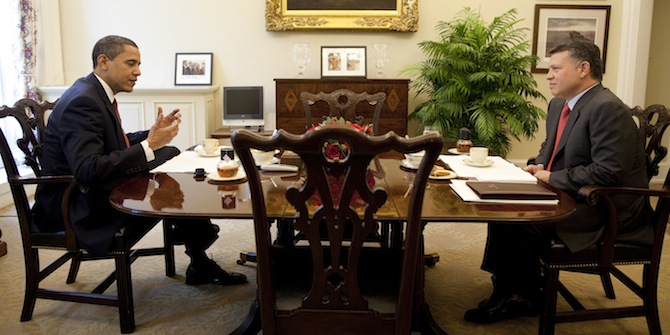by Curtis R. Ryan, Appalachian State University
This memo was prepared for ‘The Arab Thermidor: The Resurgence of the Security State’ workshop held at LSE on 10 October 2014 in collaboration with POMEPS.

Even in its darkest hours, the Jordanian version of the security state never reached the level of totalitarian police state associated with Bashar al-Assad’s Syria or Saddam Hussein’s Iraq. Yet the Hashemite regime has relied on several key institutions to ensure its own security: the armed forces, national police (Public Security Directorate – PSD), and its intelligence services (the General Intelligence Directorate [GID] or mukhabarat). Jordan is a small country, but its armed forces are among the best trained in the region, its police force often trains the police of other Arab countries, and its GID has extensive ties to both the CIA and MI6 and is considered to be among the most efficient and capable intelligence services in the region. Indeed, many opposition and democracy activists argue that the mukhabarat is far too efficient and too pervasive, and that it is, instead, the key actor blocking attempts at liberalization and reform in the Hashemite Kingdom.
By the summer of 2013, Arab regimes in Syria and Iraq remained under siege in varying degrees, the counter-revolution was well underway in Bahrain, and the military and security state staged a huge comeback in Egypt. Yet at this same time, in Jordan, the Hashemite regime almost seemed to exhale. The regime felt that it had in fact survived the Arab Spring, by carving out a “third way” between revolution and counter-revolution. Jordanian officials argued that Jordan had avoided the worst excesses of the violent turn taken by the regional Arab Spring, via a palace-led reform process that responded to public demands for change. In addition to the reform process, top regime officials pointed to several other key sources of state security: the efforts of policing and intelligence agencies to use a “soft” approach to security, extensive economic and military support from powerful external allies, and a base of popular support within Jordanian society.[1]
Jordan’s “soft security” approach even persisted amidst the regional crackdown on the Muslim Brotherhood in Egypt, Saudi Arabia, and the United Arab Emirates (all Jordanian allies). In Jordan, in contrast, the Muslim Brotherhood and its political party, the Islamic Action Front, remained legal and active within Jordanian politics. Even that moderate stance seemed to shift, at least partially, with the arrest of Zaki Bani Irshayd, a key leader of Jordan’s Muslim Brotherhood. While the organization remained legal and active, Irshayd was arrested for “harming relations” with a key ally, after he posted comments on Facebook that sharply criticized the UAE and its policies.
>> read the full memo on the Pomeps Website
Other available memos in the series
‘The Authoritarian Impulse vs. the Democratic Imperative: Political Learning as a Precondition for Sustainable Development in the Maghreb’, John P. Entelis, Fordham University
‘Elite Fragmentation and Securitization in Bahrain’, by Toby Matthiesen, University of Cambridge
‘Militaries, Civilians and the Crisis of the Arab State’, by Yezid Sayigh, Carnegie Middle East Center
‘Arab Transitions and the Old Elite’, by Ellis Goldberg, University of Washington
‘Explaining Democratic Divergence: Why Tunisia has Succeeded and Egypt has Failed’, Eva Bellin, Brandeis University
‘Is Libya a Proxy War?’, Frederic Wehrey, Carnegie Endowment for International Peace
‘Fiscal Politics of Enduring Authoritarianism’, Pete W. Moore, Case Western Reserve University
‘The Role of Militaries in the Arab Thermidor’, Robert Springborg, Sciences Po
‘Mass Politics and the Future of Authoritarian Governance in the Arab World’, Steven Heydemann, United States Institute of Peace
‘Authoritarian Populism and the Rise of the Security State in Iran’, Ali Ansari, University of St Andrews
‘A Historical Sociology Approach to Authoritarian Resilience in Post-Arab Uprising MENA’, Raymond Hinnebusch, University of St Andrews
‘The Arab Thermidor’, Marc Lynch, George Washington University




